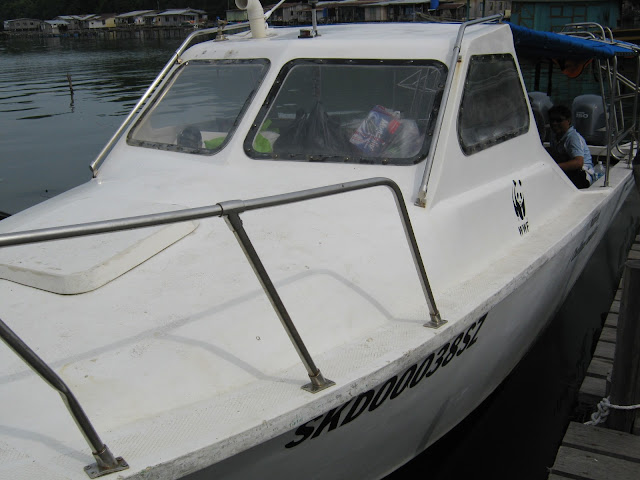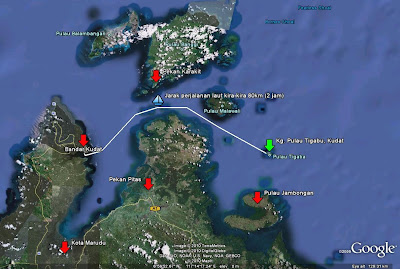Mameng, My Heroine.
A survivor in our marine ecosystem.
I
remember how fairy tales used to amuse me. Every fairy tale has a hero who is
in charge of the rescue in his elegant white horse and save the heroine from
the evil intention of the villain. The villain will be defeated and a
happy-ever-after ending. Frankly speaking, how is that possible in this cold
metal castle built in the middle of the concrete forest? It is almost not
possible to spot a cricket on the ground, what more a white horse. Yet, in this
midst of impossibilities, I found the heroic moment. There were no white horse
but the moment was real.
It was
the last dive of the expedition and the storm has only subsided the previous
night. The storm has dampened most of our spirits as we had to abort some of our
dives due to the weather difficulties. As the sun rose, the expedition braved
into another day against the strong surge of currents in order to collect as
much data as possible to assess aspects of marine biodiversity and ecology in
the proposed Tun Mustapha Park (TMP).
Ali and
I joined the Reef Check team in Navorca by dawn and both vessels moved in their
separate path and their own speeds to the pre-decided dive sites before meeting
again at our docking point near the jetty of Kudat town.
It was
a beautiful morning as we were sailing to the north of Balambangan Island. The
sea looked less frightening compared to the nights before and rays of sunlight
seemed to provide some hope for one good end to our expedition dives and
data-collection. Navorca anchored at the meeting point before we board our
speedboats to the selected dive sites. The currents’ strength built up by minutes
count and Mameng – our speedboat -
was struggling to keep a distance from Navorca to avoid damages crashing
against one another. After loading our equipment, we dutifully hopped into Mameng and speed off.
We have
only managed to do one dive before the currents became too strong for another
dive. The last dive site had a very low visibility as sand was stirred. We
could hardly see our palms at arm length. The biodiversity however record a
good abundance of reef fishes despite the muddy water.
The currents
had forced Navorca to leave us and meet us at the jetty instead. Under such
circumstances, Mameng had to travel
added miles in order to meet Navorca. Then, Mameng
has just reported back to work after one failed engine and is surviving with
only one.
 |
| The front view of Mameng. © WWF-Malaysia/Hui Ling |
I was concerned
at the possibility of Mameng making
it back to the jetty with one engine and a boat loaded with at least 13 sets of
diving equipment. I sat next to the Captain and the engine repeatedly died at
every few miles. At one point, I thought we are going to be stranded in the
middle of the sea, nowhere near island. My mind was already thinking of the
possibility of surviving in the middle of the ocean.
I did
not think I was looking worried until Pak Damsek, the Captain of Mameng said, “Mameng will never leave us stranded in the middle of nowhere.”
“No
matter how wrecked Mameng is, she
will not let us get stranded here. Mameng
will always ensure we reach our destination safe and sound. She knows that it is
her duty.” Pak Damsek ended the statement with a comforting smile. I nodded. I
trusted him.
Other
volunteers on the boat lend a helping hand by pumping the channel that fuel the
rudder and eventually manoeuvre the propeller of the boat. Mameng fought through the strong currents with one engine- or
rather, half an engine to get us all safely back to the jetty. We managed to
board Navorca before Mameng engine
died off finally and has to be towed to the jetty. She might have been really
wrecked but nevertheless her perseverance had gained my respect.
Mameng is a true heroine in my
heart.
 |
| The side view of Mameng. © WWF-Malaysia/Hui Ling |
Actually,
mameng is a local name of Humphead wrasse. In real life, mameng is
also a hero. A survivor fighting against extinction as its population is threatened
by overfishing due to high demand as food for social gatherings and trade of
such fish worth millions of ringgits. These factors have driven mameng population to extinction.
The Humphead wrasse is particularly vulnerable
to overfishing because it takes about 5 years to reach its sexual maturity. Targeted
fishing of this high-demand and valuable fish puts it at risk of local
extinctions. The loss of this top level predator has an effect on the rest of
the ecosystem, disrupting the ecological balance of nature.
Like
the speedboat, mameng is a big fish
and is one of the biggest to be found on reefs. This coral reef fish can grow
to about 2.3 meter, weighing 190 kg and live up till 32 years!
 |
| Humphead wrasse or locally known as Mameng. © WWF-Malaysia/Eric Madeja |
The big fish is a top predator commonly found on reef slopes and also one of the few predators of toxic animals, such as crown-of-thorns and sea hares. Crown-of-thorns, you see, is a starfish with many toxic thorns. Their favourite food is coral polyps and like Death Eater in Harry Potter, they move across the corals (slower than Death Eater, of course) and portions where corals are encountered will lose their polyps. Sea hares may be beautiful but when disturbed, they also release toxic ink from their ink glands, to protect themselves. This ink could be toxic to the inhabitants and its surrounding environment, which includes coral reefs.
Adult
females of mameng are known to change
to adult males, a form of sequential hermaphroditism – an individual that has
both male and female reproductive organs - that is found not only in wrasses
but in many reef fishes. We do not yet know what controls the timing of sex
change, or how ‘decisions’ are made about which fish change sex. Indeed, we
still have much to learn about the biology of this species.
So, what
can you and I do?
Besides
asking for sustainably caught or farmed fish when dining or buying on markets,
we have to also stand against the practise of destructive fishing methods, i.e.
fish bombing and bottom trawling. Refer to our S.O.S guide (www.saveourseafood.my) when
you dine in seafood restaurants and avoid red list species such as Humphead wrasse.
Together,
you and I can make a difference.
Do not
let this fish disappear from our seas.



Comments
Post a Comment